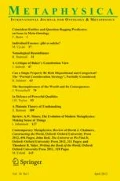Abstract
This paper argues that Kripke’s thesis of the necessity of origin has some implausible consequences.
Similar content being viewed by others
Notes
We can ignore the complication here that, strictly speaking, it is (according to Kripke) the numerical identity of the gametes and not of the parents which determines identity of origin. We can also ignore the further question, what determines the numerical identity of the gamete: the numerical identity of the molecules it is composed of or something else? Finally, we are assuming that every human (every organism) has ancestors and, more generally, that every ordinary physical object has an origin.
Where what counts as an “object” is anything that is a proper part of the physical universe as well as younger than the physical universe. We can ignore the question here what kinds of origin different kinds of things have (tables might originate in material stuff while organisms originate in genetic material).
We can add that any two organisms which stand in the A relation to each other also stand in the B relation to each other (assuming that there is no such thing as a first organism):
$$ \forall {\text{x }}\forall {\text{y }}\left[ {{\text{xAy}} \to {\text{xBy}}} \right]. $$We can add that any two objects which stand in the origin relation OR to each other also stand in the O relation to each other:
$$ \forall {\text{x}}\forall {\text{y }}[{\text{xORy}} \to {\text{xOy}}]. $$One would have to assume that there are at least two classes of objects such that no element of one class stands in the O relation to any element of the other class. Metaphorically speaking, there would have to be at least two independent branching trees of origins. If one assumes, for instance, that our universe originated in exactly one big bang (not in more than one), then it is very hard to make sense of the idea of at least two independent branching trees of origins.
References
Kripke, Saul 1980, Naming and Necessity, Cambridge/MA: Harvard University Press.
McGinn, Colin 1976, On the Necessity of Origin, in: The Journal of Philosophy 73, 127–135.
Williamson, Timothy 2002, Necessary Existents, in: Anthony O’Hear (ed.), Logic, Thought and Language, Cambridge: Cambridge University Press, 233–251.
Author information
Authors and Affiliations
Corresponding author
About this article
Cite this article
Baumann, P. On the Inflation of Necessities. Int Ontology Metaphysics 13, 51–54 (2012). https://doi.org/10.1007/s12133-012-0092-z
Published:
Issue Date:
DOI: https://doi.org/10.1007/s12133-012-0092-z




